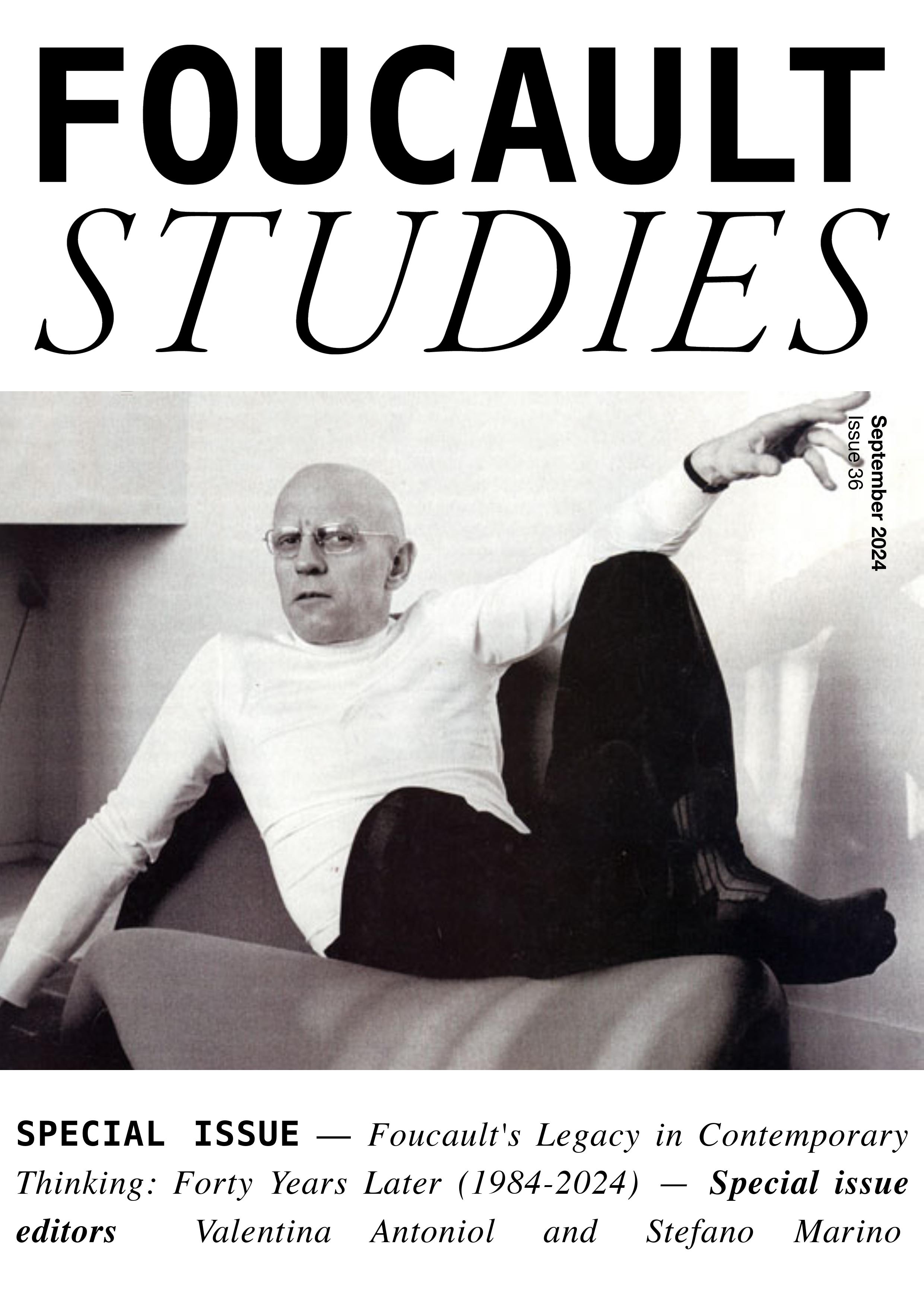Untruth as the New Democratic Ethos: Reading Michel Foucault’s Interpretation of Diogenes of Sinope’s True Life in the Time of Post-Truth Politics
DOI:
https://doi.org/10.22439/fs.i36.7216Keywords:
post-truth politics, truth-telling, Michel Foucault, Diogenes of Sinope, philosophical life, democratic ethosAbstract
Since 2016, the rise of post-truth politics has created a situation of democratic discontent in the west. While many scholars tend to regard post-truth politics as a threat to democratic order, I would like to propose that what we have been witnessing in this form of politics has been the transformation of the democratic ethos. By turning to Michel Foucault’s lecture on the true life of Diogenes of Sinope, delivered at College De France in 1984, I ascertain the framework for demonstrating how we can approach a new shape of democratic ethos in our era of post-truth politics. I argue that in Diogenes’s true life, Foucault saw the concrete life, which could liberate each individual from the constraints of their conventional lives by emphasizing the material conditions of all human bodies. Diogenes’s life could then be a form of self-emancipation since it not only showed how untrue the conventional life was but also released each individual from any conventions estranged from them. Relying on this point, I propose the notion of untruth as the new ground of our democratic lives. Though post-truth politics destroys the objective form of truth, the untruth—as its main element—can play a leading role in grounding our democratic ethos to the extent that it asserts our capability of self-emancipation.
References
Andersen, Kurt, "How America lost its mind," theatlantic.com. https://www.theatlantic.com/magazine/archive/2017/09/how-america-lost-its-mind/534231/ (accessed September 20, 2022).
Davidson, Arnold, "Spiritual Exercise and Ancient Philosophy: An Introduction to Pierre Hadot," Critical Inquiry 16:3 (1990), 475-482. https://doi.org/10.1086/ci.16.3.1343634
Devenney, Mark, Towards an Improper Politics. Edinburgh: Edinburgh University Press, 2020. https://doi.org/10.1515/9781474454056
Dyrberg, Torben, "Foucault on Parrhesia: The Autonomy of Politic and Democracy," Politi-cal Theory 44:2 (2016), 265-288. https://doi.org/10.1177/0090591715576082
Elden, Stuart, Foucault's Last Decade. Cambridge: Polity Press, 2016.
Flynn, Thomas, "Foucault as Parrhesiast: His Last Course at the College de France (1984)", in The Final Foucault, ed. James Bernauer and David Rasmussen, 102-118. Massachu-setts: The MIT Press, 1988.
Forti, Simona, "Parrhesia between East and West: Foucault and Dissidence," in The Gov-ernment of Life: Foucault, Biopolitics, and Neoliberalism, ed. Vanessa Lemm, and Miguel Vatter, 187-207. New York: Fordham University Press, 2014. https://doi.org/10.5422/fordham/9780823255962.003.0011
Foucault, Michel, "The Order of Discourse," in Untying the Text: A Post-Structuralist Reader, ed. Robert Young, trans. Ian Mcleod, 51-78. London: Routledge, 1981.
Foucault, Michel, "La philosophie analytique de la politique [1978], in Dits et Ecrits 1954-1988 III, ed. Daniel Defert, Francois Ewald and Jacques Lagrange, 534-551. Paris: Gal-limard, 1994.
Foucault, Michel, "From Torture to Cellblock," in Foucault Live (Interviews, 1961-1984), ed. Sylvere Lotringer, trans. John Johnston. New York: Semiotext(e), 1996.
Foucault, Michel, The Hermeneutics of The Subject: Lectures at The College de France, 1981-1982, ed. Arnold Davidson, trans. Graham Burchell. New York: Picador, 2005.
Foucault, Michel, The Government of Self and Others: Lectures at the College de France 1982-1983, ed. Arnold Davidson, trans. Graham Burchell. New York: Palgrave Macmillan, 2010.
Foucault, Michel, The Courage of Truth: Lectures at the College de France 1983-1984, trans. Graham Burchell, ed. Arnold Davidson. New York: Palgrave Macmillan, 2011.
Foucault, Michel, Lectures on the Will to Truth: Lectures at the Collage de France, 1970-1971 and Oedipal Knowledge, trans. Graham Burchell. New York: Picadore, 2013.
Foucault, Michel, Subjectivity and Truth: Lectures at the College de France 1980-1981, ed. Ar-nold Davidson, trans. Graham Burchell. New York: Palgrave Macmillan, 2017.
Fuller, Steve, Post-Truth: Knowledge as a Power Game. London: Anthem Press, 2018. https://doi.org/10.2307/j.ctvgd30v
Hadot, Pierre, Philosophy as a Way of Life: Spiritual Exercise from Socrates to Foucault, trans. Michael Chase, ed. Arnold Davidson, Malden: Blackwell Publishing, 1995.
Harsin, Jayson, "Regimes of Posttruth, Postpolitics and Attention Economies," Communica-tion, Culture and Critique 8:2 (2019), 327-333. https://doi.org/10.1111/cccr.12097
Kalpokas, Ignas, A Political Theory of Post-Truth. London: Palgrave Macmillan, 2019. https://doi.org/10.1007/978-3-319-97713-3
Laertius, Diogenes, Lives of The Eminent Philosophers, ed. James Miller and Arnold Da-vidson. Oxford: Oxford University Press, 2018.
Luxon, Nancy, "Ethics and Subjectivity: Practices of Self-Governance in the Late Lectures of Michel Foucault," Political Theory 36:3 (2008), 377-402. https://doi.org/10.1177/0090591708315143
Lorenzini, Daniele, "Genealogy as a Practice of Truth: Nietzsche, Foucault, Fanon," in Prac-tice of Truth in Philosophy: Historical and Comparative Perspectives, ed. Pietro Gori and Lo-renzo Serini. New York: Routledge, 2023. https://doi.org/10.4324/9781003273493-14
Malabou, Catherine, "Cynicism and anarchism in Foucault's last seminars," in Afterlives: Transcendentals, Universals, Others, ed. Peter Osborn, 146-162. London: CRMEP Books, 2022.
McGoey, Linsey, Unknowers: How Strategic Ignorance Rules the World. London: Zed Books, 2019. https://doi.org/10.5040/9781350225725
McGushin, Edward, Foucault's Askesis: An Introduction to the Philosophical Life. Illinois: Northwestern University Press, 2007. https://doi.org/10.2307/j.ctv43vtxw
Muirhead, Russell, and Nancy Rosenblum, A Lot of People Are Saying: The New Conspiracism and the Assault on Democracy. Princeton: Princeton University Press, 2019. https://doi.org/10.2307/j.ctv941trn
Oxford Dictionaries, "Word of the Year of 2016 is," Languages.oup.com. https://languages.oup.com/word-of-the- year/2016/. Retrieved in 2022-11-07. (accessed September 2, 2022).
Prozorov, Sergei, "Why is there truth: Foucault in the age of post-truth politics," Constella-tions 26:1 (2019), 18-30. https://doi.org/10.1111/1467-8675.12396
Sim, Stuart, Post-Truth, Scepticism and Power. London: Palgrave Macmillan, 2019. https://doi.org/10.1007/978-3-030-15876-7
Tallis, Benjamin, "Living in post-truth," New Perspectives 24:1 (2016), 7-18. https://doi.org/10.1177/2336825X1602400101
Veyne, Paul, "The Final Foucault and his Ethics," in Foucault and His Interlocutors, ed. Ar-nold Davidson, trans. Catherine Porter and Arnold Davidson. Chicago: The University of Chicago Press, 1997.
Williams, Casey, "Has Trump stolen philosophy's critical tools?," nytimes.com. https://www.nytimes.com/2017/04/17/opinion/has-trump-stolen-philosophys-critical-tools.html (accessed September 12, 2022).
Downloads
Published
How to Cite
Issue
Section
License
Copyright (c) 2024 Attasit Sittidumrong

This work is licensed under a Creative Commons Attribution-NonCommercial-NoDerivatives 4.0 International License.
Authors retain copyright to their work, but assign the right of the first publication to Foucault Studies. The work is subject to a CC BY-NC-ND 4.0 license, but despite these restrictions, authors can take for granted that Foucault Studies will permit articles published in Foucault Studies to be translated or reprinted in another format such as a book providing a full reference is made to Foucault Studies as the original place of publication.



